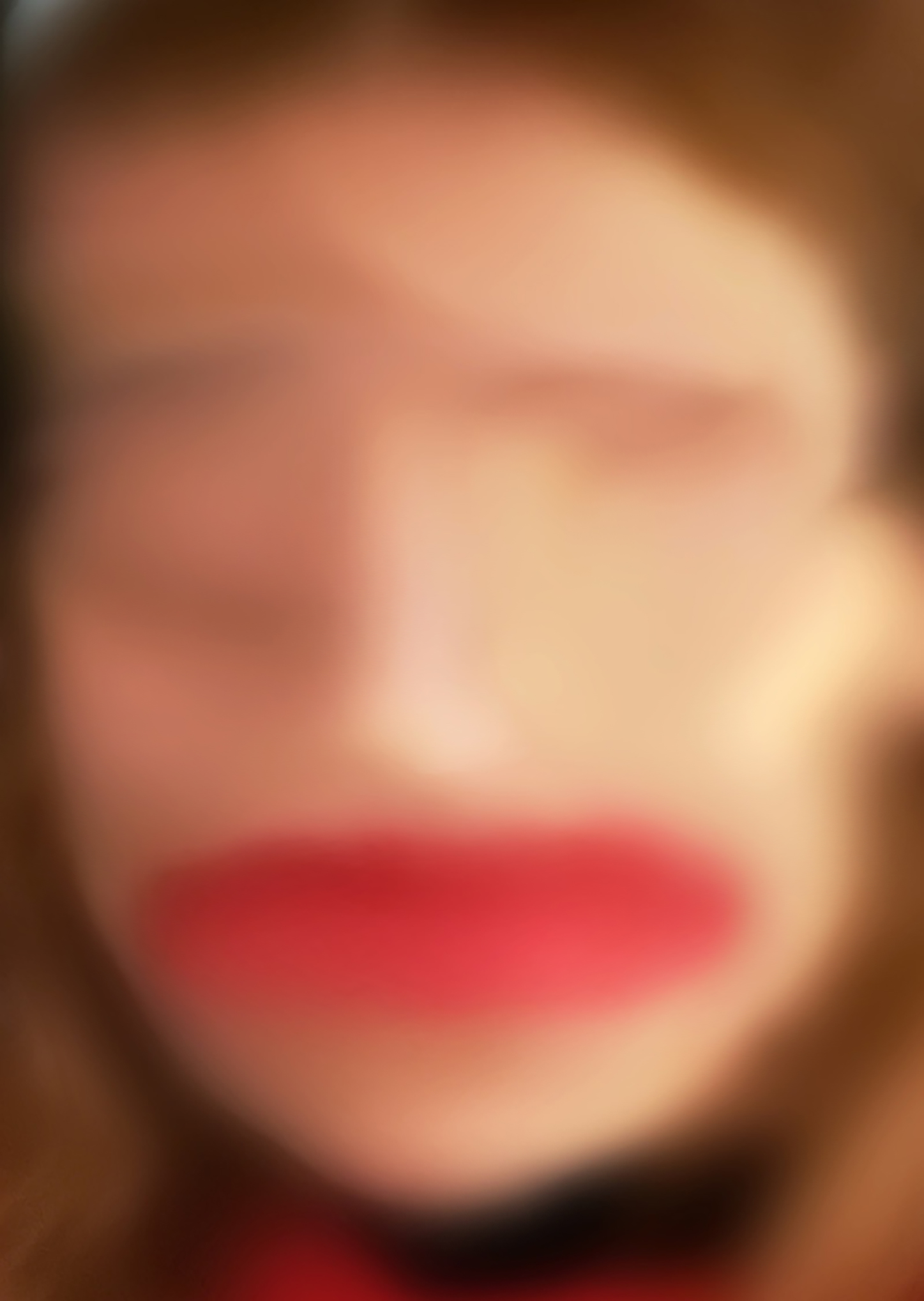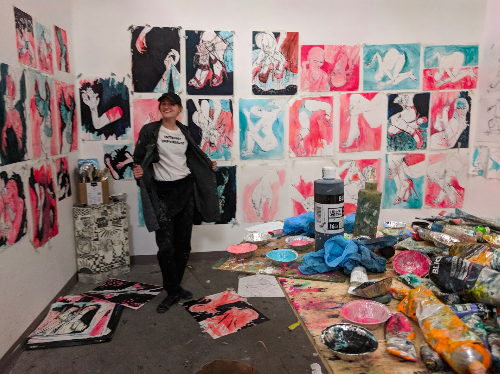Mozilla features a conversation between Gretchen Andrew and Amira Dhalla.
This Artist’s Paintings Are Making the Internet More Open and Equal
By Amira Dhalla
Search Engine Artist and self-proclaimed Internet Imperialist Gretchen Andrew’s art studio doesn’t even have Wi-Fi. Yet this is the epicenter from which Gretchen is changing how, and by whom, women are represented online.
The messy studio and her paintings, which recall stylistic elements of Georg Baselitz and Alberto Giacometti, are the physical manifestation of an artistic process that isn’t obvious on their surface. This is not unlike Gretchen herself, a culture hacker contrarian whose resume nonetheless proffers a degree in Information Systems from Boston College, brief careers at Intuit and Google as well as a guest lectures at Cambridge. It is in what she does with her paintings between her studio and the private collections of some of today’s more in-tune collectors that her growing reputation as one of today’s most interesting “digital artist” can be explained.
In celebration of our 2018 Internet Health Report, we sat down to talk with Gretchen about her work and how it relates to the health and future of internet culture.
Tell us about your artistic process. And, how the related internet activism you call “Internet Imperialism” impacts how women are represented online.
I’m interested in where language fails as a poetic part of painting’s the Raison D’être. Technology has a particularly hard time with nuance, relativity, and the gaps in language. The result is it often compresses human complexity into a caricature of itself that also ends up sexist, racist, and deeply intolerant of difference.
I start by making paintings about a personal theme that I then can also define in terms of what the internet refers to as “keywords.” Once the paintings are completed in the studio, I program their images in a way that manipulates and dominates the search results of the theme/keyword, a process I call Internet Imperialism.
To address how women are represented online I’ve made two drawing series: “powerful person,” whose current results show almost exclusively western, male, white political figures; and “perfect female body,” which shows faceless photographs of women with high sexualization and low diversity.
My series debunk the current stereotypes that currently exist in keywords to open up searches to a more inclusive representation. As my drawings come to dominate the top results for these searches, users and artificially intelligent machines are forced to reconcile an alternative way of defining power and the female body. The resulting search page is a form of ever changing digital performance that points back to the individual paintings and forward to a healthier and more representative internet.
How do the changes in search results you create contribute to a healthier internet?
In applying Internet Imperialism I contribute my art’s complexity, humanity, and diversity to the internet while also raising red flags as to how authority is distributed online. This makes a more fair, equal, and thus healthy internet because it is more representative of actual people. It is not that my drawings are the best and only way to define power and the female body, but that in art we are more easily reminded of the inherent subjectivity of all images.
What sort of action do you see making an impact on how women are represented online?
Broadly speaking, non-product based self representation makes a healthier internet for women and other underrepresented or misrepresented groups. But this sort of effective impact is rare at the moment. It’s becoming more clear how illusory a non-commercial internet is. While corporations like Google, Amazon, and Facebook have done amazing work to get the internet organized, I believe its organizational principles are fundamentally flawed because the internet is being primarily considered a business instead of a public good. Mozilla addresses this point in the 2018 Internet Health Report when discussing Too Big Tech. If we consider it like roads and libraries, its potential is much greater.
What do you mean when you say the internet’s current organizational principles have become fundamentally flawed? Can you share some examples?
The internet’s hippy roots are so drastically different from what it has become.
I love how this year’s Internet Health Report comments on this via it’s Spotlight on Fake News: “many argue that we’ll still have to tackle a bigger Internet health problem: the underlying online advertising and engagement model that rewards abuse, fraud and misinformation. It’s hard to imagine fixing this problem without regulation, radical changes in internet business models or both.”
The reason why women are sexualized online is the same reason why when you search for “citizen” all of the top results are dominated by the Japanese watch company of the same name — because at every opportunity, the major internet companies turn everything into a product for consumption. Consider how #accordingToTheInterent Amazon isn’t a river and Cherokee is the model of a car before a tribe of people. The current product-first internet is defined by a structural preference for products over people, companies over communities, and commerce over culture. Within this system girls are sexualized women because the internet is treating them not as people but as consumable products.
This relates to the Mozilla Foundation internet health topics of digital inclusion (who is welcome online) and web literacy (who can succeed online). What other indicators of internet health have you come across in your work?
Related to digital inclusion, I’ve been thinking a lot about artificial intelligence — how our current internet is being used to train the future internet. AI technology is learning to identify who is and is not a person without input and representation of many people, communities, and knowledge forms. Human complexity is not well represented online and therefore machines are not learning that it exists or should be valued. I’m not sure how this AI dystopia will play out, but we are making machines that don’t equally respect us all, giving systemic inequities new magnitude.
Nicolas Berggruen asks, “How do you plan to raise your super-intelligent child?”
By force feeding my artwork to search engines, I am also involving my paintings in the training material of artificially intelligent machines and making some impact on how machines understand and define the world. It’s taking the idea that an arts education is valuable to people and defending that this is also true with the education of machines and for many of the same reasons.
What motivates you to extend your art practice into activism?
My formative online years were during a period before people really figured out how to make money with the internet, and as a result the internet felt more human in its surface weirdness, more like riding a public bus than taking an Uber.
I’m also motivated by a bit of a light-hearted personal power trip, my own ability to assert my view as expressed through my paintings onto an international digital landscape at the same scale as multinational corporations. I can only do this because of an information gap. If more of us understood how search engines work (web literacy) and how our own content impacts digital inclusion, I would not be able to be an Internet Imperialist. No single voice — mine or a company’s — could dominate so easily. I use my work to express the importance of understanding how the internet operates.
How do you want to share this work?
My favorite thing about sharing my paintings within a search engine is the how they are inflicted on search engine users like a sort of internet graffiti where the viewer isn’t in the same mindset they would be when entering a museum. But I also love the way my paintings exist traditionally as objects that are cherished by their owners.
What are you working on next?
Continuing the awareness that the internet struggles with nuance, I am working some paintings that are based on untranslatable words including one for Wikipedia’s annual conference, What Is Ubuntu? Another of my favorites is L’appel du vide which is a french expression literally meaning the “The call of the void.” It describe the instinctive urge to jump from high places. In this I read a sort of desire for self sabotage on the road to our desires.


